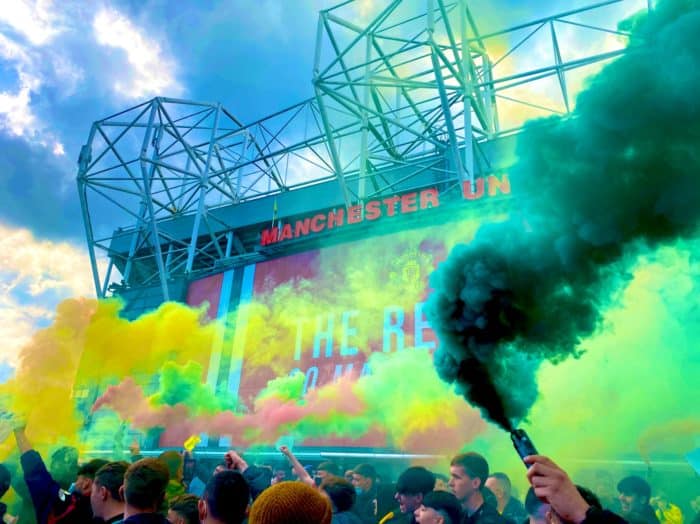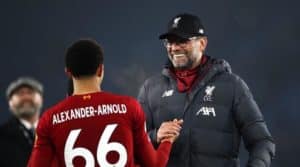Manchester United will play three Premier League matches in just five days after their postponed game against Liverpool was rescheduled for next Thursday.
Sunday’s clash between the bitter rivals was called off due to United fans’ anti-Glazer protest, where some supporters got into Old Trafford and on to the pitch.
That match has now been rearranged for 13 May, which follows hot on the heels of the 9 May trip to Aston Villa and home match against third-placed Leicester on 11 May.
United have the small matter of Thursday’s Europa League semi-final second leg at Roma to come first, with Ole Gunnar Solskjaer sure to be furious about the scheduling as a challenging season comes to a cluttered conclusion.

The club posted on their website: ‘Each of our three remaining Old Trafford dates, against Leicester City, Liverpool and Fulham, have been rearranged, with the first two affected by Sunday’s postponement.
‘United v Liverpool will now be played at 20:15 BST on Thursday 13 May and, as intended originally, the game will be broadcast live on Sky Sports.
‘The scheduling of that fixture means the visit of Leicester – already rearranged due to the Foxes’ involvement in the Emirates FA Cup final – has been put back 24 hours to Tuesday 11 May.’
Assuming Solskjaer’s men do not blow their 6-2 semi-final first-leg advantage against Roma, they will be playing seven matches in 21 days – a period that will include trips to Italy and Poland.
Among those fixtures will be the return of fans to Old Trafford for the first time since March 2020.
The Premier League’s updated fixture schedule confirmed that United’s home match against Fulham will be among the first to host supporters when coronavirus restrictions are lifted on 17 May.
Solskjaer’s side will host the Cottagers at 6pm the following day, when Southampton will kick off at home to Leeds.
Up to 10,000 fans will be allowed into matches in round 37 on 18 and 19 May and in round 38 on 23 May, provided the government goes ahead with the planned easing of coronavirus restrictions.
The Premier League announced on Wednesday that away fans will be barred from attending the final two rounds of games.
‘Following consultation with clubs, it was agreed matches would not be open to away supporters due to varying operational challenges across the league and the need to deliver a consistent approach, while maximising the opportunity for home-fan attendance,’ a league statement read.
‘The safety and security of supporters is of paramount importance. Clubs have a proven track record of providing Covid-safe environments and have operational plans in place ready to safely welcome supporters back to their stadiums.’
The government is set to announce whether or not restrictions will be eased no later than 10 May.

But the data is encouraging, with deaths at their lowest levels for seven months, according to the Office of National Statistics.
The league had been understood to be keen to open up the final two rounds to fans to avoid any issues around competition integrity.
The Premier League is yet to confirm what mitigations will be in place for those wishing to attend, with fans at last month’s Carabao Cup final required to provide proof of two negative coronavirus tests before entry to Wembley.
Liverpool were one of the first clubs to announce their plans for allocating tickets for the match against Crystal Palace on 23 May.
The Reds statement only said fans were ‘encouraged’ to take a Covid-19 test prior to attending.
The league is supportive of a Covid-19 certification system, with its executive director Bill Bush having previously described it as ‘an acceptable burden’ in order to get spectators back into venues in financially viable numbers.
Premier League chief executive Richard Masters spoke in March about his ambition to have stadiums operating at full capacity next season.





